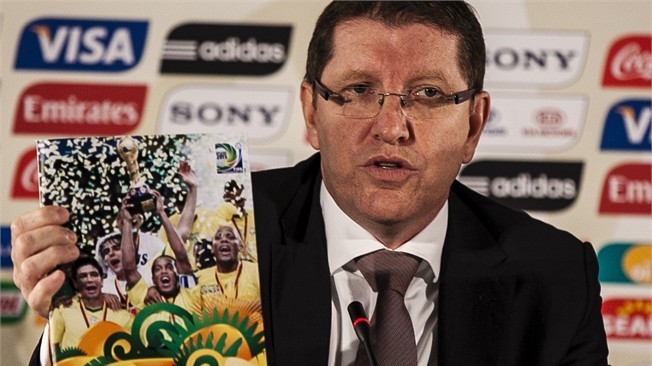By Paul Nicholson
September 4 – World Cup 2014 ticket prices have again been the subject of debate as FIFA marketing director Thierry Weil has robustly responded, in writing, to a Swiss press report that FIFA’s World Cup final is the domain of an exclusive few.
Weil argues that this is in fact far from the reality of the situation. In an article titled ‘World Cup for all football fans’ he outlines the ticketing policy in detail and why the World Cup cannot be compared to pricing for a normal league match – though in fact many World Cup tickets for Brazilians will be considerably cheaper than tickets to an English Premier League match.
Weil compares the price of World Cup tickets with other global sporting events and, though not saying so directly, asks where the greater value lies. For a committed football fan, the answer is obvious.
One surprising statistic to come out of Weil’s comment is that 77% of World Cup Final tickets in 2010 were sold directly to football fans. The impression has generally been that hardly any tickets made it to general sale.
Perhaps more likely is that not everyone who ended up buying one of these tickets attended the match but instead released them on to the black market for huge profit – a problem that is hard to solve, though FIFA have made various attempts, and results in massively inflated ticket pricing.
The fact remains that the hottest ticket to hold for any event globally in 2014 will be one for the Maracana on World Cup Final day, July 13. Any ticket holder who does get lucky in the ballot will be entitled to feel like a golden ticket holder in Roald Dahl’s Charlie in the Chocolate Factory. And it is hard to put a price on that.
Weil’s comment makes interesting reading and is printed in full below:
World Cup for all football fans
Comment by Thierry Weil, FIFA Director of Marketing
‘The NZZ (Neue Züricher Zeitung) article entitled “World Cup final for an exclusive group of people” gives people the impression that FIFA is only interested in maximising its profits through high ticket prices at the expense of the local population and international football fans. That, however, in no way reflects the reality. Generally speaking, the demand for FIFA World Cup™ tickets always exceeds the number of available tickets many times over. Indeed, for the 2014 FIFA World Cup final alone, more than 480,000 tickets have been requested since the launch of the first phase of sales on 20 August 2013, even though the stadium has a capacity of approximately 73,000. Ensuring a fair distribution of tickets among local spectators, international fans and sponsors is therefore perhaps one of the most difficult challenges for FIFA.
It goes without saying that the prices for an event of the size and magnitude of the FIFA World Cup cannot be compared to the prices for a normal league match. Nevertheless, FIFA always strives to put a pricing policy in place that is fair and that meets the various requirements. As such, the ticket prices for the 2014 FIFA World Cup™ are comparable to those for other major international events. To come back to the NZZ’s comment about the annual Ice Hockey World Championship, in 2012, fans had to pay between USD 205 and USD 258 just for a ticket to the group-stage match between Belarus and Finland. By way of comparison, the cheapest tickets for the FIFA World Cup™ group-stage matches will start at USD 15 for Brazilians and at USD 90 for international fans.
Furthermore, even tickets for the FIFA World Cup™ final itself – probably the most-popular single-day event in the world of sport – are also fair when compared to other international events. Tickets for the Formula 1 race in Brazil, for example, cost between USD 500 and USD 7,100, and the cheapest tickets for the Super Bowl start at USD 1,920. Tickets for the athletics finals at the Olympic Games cost between USD 75 and USD 1,100, whereas tickets for the closing ceremony were officially priced at between USD 234 and USD 2,300. However, the prices for FIFA World Cup™ final tickets at the Maracanã on 13 July 2014 will start at USD 80 for Brazilians and at USD 440 for international fans.
To ensure that fans of participating teams have a good level of access to tickets, for each match FIFA always reserves eight per cent of the tickets for each of the two teams playing in that match. That means that for each of the 64 matches in the FIFA World Cup™, at least 16% of all seats in every stadium are reserved for the fans of the two participating teams – and that is in addition to the tickets that are available to all fans in the general sales phases. FIFA sells these tickets directly to the fans – in cooperation with the qualified associations – via a special section on FIFA.com.
Finally, to come back to the “exclusive group of people”: in 2010, around 77% of all tickets were sold directly to the public, 32% of which were in the cheapest category 4 to South Africans. At the FIFA Confederations Cup in June, around 6,500 Brazilians benefitted from tickets to the final at a reduced price. In this regard, we would also like to clear up another myth: our sponsors also have to buy their tickets and tell FIFA for which promotional activities they will be used. More than 80% are then used for draws and competitions, which gives hundreds of thousands of football fans the chance to attend the FIFA World Cup™.’
Contact the writer of this story at moc.l1745528485labto1745528485ofdlr1745528485owedi1745528485sni@n1745528485osloh1745528485cin.l1745528485uap1745528485

